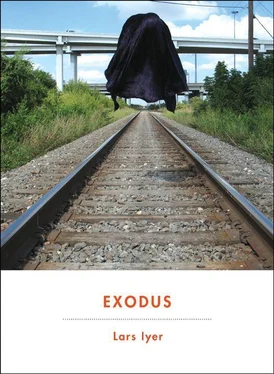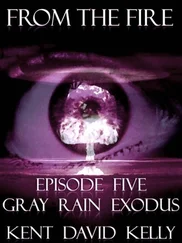4.40 AM. Dawn. Birds singing.
We need to wait, W. tells the postgraduates, as we watch the first plane take off from Plymouth Airport. We need to be watchful, and as watchmen, drunk. Above all, we need to drink! W. tells the postgraduates, filling their cups. We need to perfect a continual drunkenness, he tells them. A vigilant drunkenness! A sober drunkenness!
There’s no point in going to sleep, W. tells the Plymouth postgraduates. What use is sleep to us? We must stay awake, ever-watchful. We must stand watch for signs of revolution. We must be like the pillar saints, waiting for God. We must imitate Saint Anthony in the desert, wrestling with his demons. And above all we must wait, and wait together. Above all!
God gives the sky the dimensions of His absence , I quote from Jabès. God … he doesn’t know what God means, W. says.
4.44 AM. He wishes he could summon the former Essex postgraduates to his side, W. says. He wishes he could blow a great horn, like that guy in Anchorman , and have them all come running.
The scattered tribes would be reunited! The exiles would be ingathered from foreign lands, ready for the last battle …
4.52 AM. W. thinks of Marx on his deathbed, cursing the country he had adopted. ‘England is the rock against which revolutionary waves break, the country where the new society is stifled even in the womb’ . Drat England! Marx said. Drat Britain!
W. thinks of Debord, shooting himself in the heart at his house in the Auvergne. He thinks of Weil, starving herself to death. He thinks of Duras, drying out in one clinic, then another … Drat the world! W. says. Drat our times!
5.00 AM. If only we could sleep, really sleep, W. says. If only we could rest .
W. dreams of the profound slumber from which we would rise reborn, ready for the morning, ready for work. He dreams of the great day that would follow our night of rest, and of the great ideas that would flash above us like diurnal stars.
How is it still alive in him, the belief that he might wake into genius? , W. says. How is it that he still believes, despite everything, that he is a man of thought ?
5.40 AM. We think with our tears, with our sadnesses, W. says. We think from our humiliations, our desperations …
5.43 AM. Thought is the hangman, our hangman, W. says. Thought has its nooses ready, just for us.
5.55 AM. Really, thought is a kind of assault , W. says.
6.02 AM. To think is to stray. To think is to err greatly : who was it said that? W. wonders. Well, there’s erring and erring . There’s straying and straying , W. says.
6.11 AM. In the end, thought is dread, W. says. It is indistinguishable from dread.
6.44 AM. ‘Are they coming for us?’, W. asks. — ‘Can you hear sirens?’ No one’s coming, I tell him. I can hear nothing but birdsong and faraway cars.
7.00 AM. All around us, on the grass, the Plymouth postgraduates are sleeping. All of God’s children are asleep.
What are they dreaming of? we wonder. Of wide, high Dartmoor, W. hopes. Of cider made from the apples of the moor. Of songs of peace and gentleness sung on the moor. And of Plymouth Sound, seen all the way from the moor, glinting like utopia.
LARS IYER is a lecturer in philosophy at the Newcastle University. He is the author of Spurious , which was 3:AM Magazine ’s Book of the Year in 2011, Dogma , two books on Blanchot ( Blanchot’s Communism: Art, Philosophy, and the Political and Blanchot’s Vigilance: Literature, Phenomenology, and the Ethical ), and his blog Spurious. He is also a contributor to Britain’s leading literary blog, Ready, Steady, Book . His literary manifesto, “Nude in Your Hot Tub, Facing the Abyss” appeared in Post Road and The White Review .












